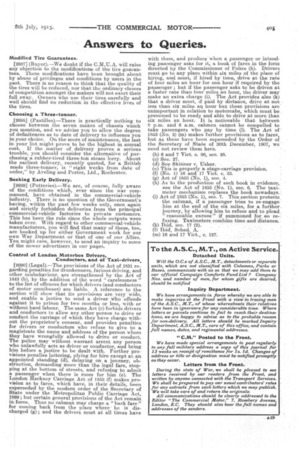Answers to Queries.
Page 19

If you've noticed an error in this article please click here to report it so we can fix it.
Modified Tire Guarantees.
[2687] (Buyer).—We doubt if the C.M.U.A. will raise any objection to the modifications of the tire guarantees. These modifications have been brought about by abuse of privileges and conditions by users in the past. There is no reason to think that the quality of the tires will be reduced, nor that the ordinary classes of competition amongst the makers will not exert their full sway. Owners who use their tires carefully and well should find no reduction in the effective lives of the tires.
Choosing a Three-tonner.
[2688] (Pastilles).—There is practically nothing to choose between the seven makes of chassis which you mention, and we advise you to allow the degree of definiteness as to date of delivery to influence you in your choice. On the score of maintenance, the last in your list might prove to be the highest in annual cost. If the matter of delivery proves a serious trouble, you should consider the alternative of purchasing a rubber-tired three-ton steam lorry. About the earliest delivery, recently quoted, for a British made three-tonner, is "eight weeks from date of order," by Ave-ling and Porter, Ltd., Rochester.
Seeking Early Delivery.
[2689] (Potteries).—We are, of course, fully aware of the conditions which, ever since the war commenced, have obtained in the commercial-vehicle industry. There is no question of the Government's having, within the past few weeks only, once again and strictly forbidden deliveries from the principal commercial-vehicle factories to private customers. This has been the rule since the whole outputs were taken over. With regard to other commercial-vehicle manufacturers, you will find that many of these, too, are booked up for either Government work for our own War Department or that of one of our Allies. You might care, however,. to send an inquiry to some of the newer advertisers in our pages.
Control of London Motorbus Drivers, Conductors, and of Taxi-drivers.
[2690] (Legal).—The provisions of the Act of .1831 regarding penalties for drunkenness, furious driving, and other misbehaviour, are strengthened by the Act of 1843 (b), by the addition of the word "carelessness " to the list of offences for which drivers (and conductors of motor omnibuses) are liable. .A reference to the section will show that its provisions are very wide, and enable a justice to send a driver who offends against it to prison for two months or less, with or without hard labour. The same Act (c) forbids drivers and conductors to allow any other person to drive or conduct the carriage of which they have charge without the proprietor's consent, and provides penalties for drivers or conductors who refuse to give to a magistrate the name and address of the person whom they have wrongfully allowed to drive or conduct. The police may without warrant arrest any person who unlawfully acts as driver or conductor, and bring him before a justice to be dealt with. Further provisions penalize loitering, plying for hire except at an appointed standing (d), delaying on a journey, obstruction, demanding more than the legal fare, stopping at the bottom of streets, and refusing to admit a passenger when there is room for him (e). The London Hackney Carriage Act of 1853 (f) makes provision as to fares, which have, in their details, been superseded by the modern order of the Secretary of State under the Metropolitan Public Carriage Act, i89; but certain general provisions of the Act remain in force. Thus no cabman may charge a "back fare" for coming back from the place where he is discharged (g); and the drivers must at all times have with them, and produce'when a passenger or intending passenger asks for it, a book of fares in the form directed by the Commissioner of Police (h). Drivers must go to any place within six miles of the place of hiring, and must, if hired by time, drive at the rate of four miles an hour for one hour if required by the passenger ; but if the passenger asks to be driven at a faster rate than four miles an hour, the driver may make an extra charge (i). The Act provides also (k) that a driver must, if paid by distance, drive at not less than six miles aq hour but these provisions are' unimportant in relation to motorcabs, which must be. presumed to be ready and able to drive at more than six miles an hour. It is noticeable that between 8 p.m. and 6 am. cabmen cannot be compelled to take passengers who pay by time (1). The Act of 1853 (No. 2) (m) makes further provisions as to fares, but as these have been superseded by the Order of the Secretary. of State of 30th December, 1907, we need not review them here.
(b) 6 and 7 Viet. c. 86, sec. 28.
(c) Sec. 27.
(d) See Skinner v. Usher. (e) This is properly a stage-carriage provision. (f) (No. 1) 16 and 17 Yid. e. 33.
(g) Act of 1853 (No. 1), sec. 4.
(h) As to the production of such book in evidence, see the Act of 1853 (No. 1), sec. 6. The taximeter mechanism replaces the book nowadays., (i) Act of 1853 (No. 1), sec. 7. This section protects_ the cabman, if a passenger tries to re-engage him at the end of the six miles, for a further. journey, by allowing him to refuse and to plead. reasonable excuse" if summoned for so refusing. Taximeters combine time and distance. (k) Ibid, sec. 17 (2).
(D Ibid, Sched. A.
(m) 16 and 17 Viet., c. 127.






















